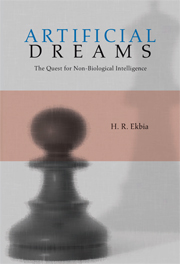Book contents
- Frontmatter
- Contents
- List of Figures and Tables
- Preface
- Prologue
- 1 GPS: The Origins of AI
- 2 Deep Blue: Supercomputing AI
- 3 Cyborgs: Cybernetic AI
- 4 Cyc: Knowledge-Intensive AI
- 5 Coach and Chef: Case-Based AI
- 6 Language Learning: Connectionist AI
- 7 Mathematical Models: Dynamical AI
- 8 Cog: Neorobotic AI
- 9 Copycat: Analogical AI
- Epilogue
- Appendix A Minimax and Alpha-Beta Pruning
- Appendix B An Introduction to Connectionism
- Appendix C The Language Acquisition Debate
- Notes
- Bibliography
- Author Index
- Subject Index
5 - Coach and Chef: Case-Based AI
Wittgenstein's Scruffy Dream
Published online by Cambridge University Press: 05 June 2012
- Frontmatter
- Contents
- List of Figures and Tables
- Preface
- Prologue
- 1 GPS: The Origins of AI
- 2 Deep Blue: Supercomputing AI
- 3 Cyborgs: Cybernetic AI
- 4 Cyc: Knowledge-Intensive AI
- 5 Coach and Chef: Case-Based AI
- 6 Language Learning: Connectionist AI
- 7 Mathematical Models: Dynamical AI
- 8 Cog: Neorobotic AI
- 9 Copycat: Analogical AI
- Epilogue
- Appendix A Minimax and Alpha-Beta Pruning
- Appendix B An Introduction to Connectionism
- Appendix C The Language Acquisition Debate
- Notes
- Bibliography
- Author Index
- Subject Index
Summary
We do talk of artificial feet, but not of artificial pain in the foot.
– Ludwig WittgensteinCase-based reasoning (CBR) is a prolific research program in AI and cognitive science. Originally motivated by the study of natural-language processing, it has been applied to computer models of story-understanding, learning, and planning, as well as a host of commercial, manufacturing, legal, and educational areas such as multimedia instruction and design.
As its name implies, case-based reasoning involves the interplay of two major themes: a (positive) theme about “cases” and a (negative) theme about “reasoning.” The core intuition in CBR is that people reason and learn from experience, and that the knowledge acquired from experience, captured in cases, is central to their understanding of the world. In the domain of language, this intuition gives primacy to meaning and “semantics,” as opposed to form and “syntax,” which were of prime concern in the logicist approach. As a negative claim, therefore, CBR presents a challenge to (formal) logic. It promotes a different kind of reasoning than deductive inference, and emphasizes the role of memory in human cognition.
This chapter is structured to reflect these two themes. Starting with a brief overview of classical models and the treatment of meaning in the logicist tradition, it provides the background conditions for the later discussion of linguistic approaches to meaning, which sets the stage for CBR.
- Type
- Chapter
- Information
- Artificial DreamsThe Quest for Non-Biological Intelligence, pp. 134 - 171Publisher: Cambridge University PressPrint publication year: 2008



